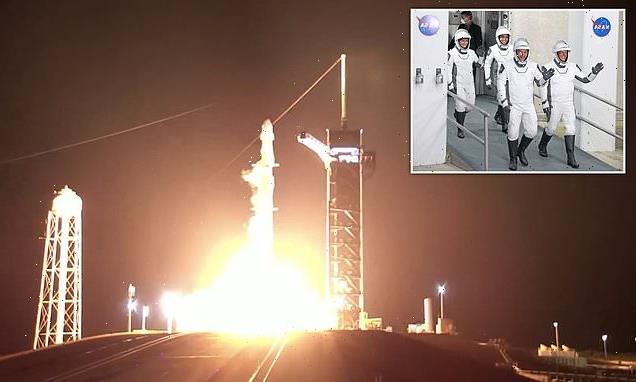Russia: Large fire spotted at oil depot in Bryansk
We use your sign-up to provide content in ways you’ve consented to and to improve our understanding of you. This may include adverts from us and 3rd parties based on our understanding. You can unsubscribe at any time. More info
Russia’s state-owned oil giant Rosneft reportedly failed to find enough buyers to fill a fleet of oil tankers last week, according to traders familiar with the matter. The company is run by Igor Sechin, a long time Putin ally, who invited bids for 38million barrels of oil. The company demanded payments to be made in rubles and said the oil would be loaded onto tankers at ports in the Baltic and Black Seas over the next two months.
But buyers did not seem interested.
Military expert Chuck Pfarrer tweeted: “Russian oil giant Rosneft, run by longtime Putin ally Igor Sechin, invited bids for 38 million barrels of oil this week.
“No one was buying. Russia doesn’t have space to store oil, so lack of demand causes producers to stop output. And that is bad.“
Rosneft is known for drilling for oil and gas, and refining crude for reusable fuels.
It usually then outsources the selling to be done by a number of traders, such as Vitol and Glencore PLC, who then ship the oil on to buyers.


But traders are now said to be leaving the Russian market ahead of EU sanctions.
Vitol, which has been working with Russia for over 30 years, is reportedly due to stop trading with Moscow by the end of the year.
It comes as the EU has been mulling over a Russian oil embargo for a number of weeks as it attempts to scupper its dependence on Putin’s energy imports amid the Ukraine war.
Last year, the EU imported a staggering €48.5billion (£38billion) of crude oil, and €22.5billion (£19billion) of petroleum oils other than crude.
While the bloc is yet to agree on a plan of action for sanctioning Russian oil outright, its REPowerEU energy strategy does have a goal of slashing oil and gas imports by two thirds by the end of the year.

Although it is not a full-scale embargo, the EU did lay out sanctions in mid-March that will ban companies from reselling Rosneft oil outside of Europe.
But an immediate embargo is proving to be a more contentious issue within the bloc.
A ban has been backed by countries like France and Poland, but staunchly opposed by Germany and Hungary.
Meanwhile, the EU Parliament voted overwhelmingly in favour of a ban on all of Putin’s hydrocarbons.
Germany’s resistance has sparked fury among a group of 50 MEPs, who signed a letter addressed to German Chancellor Olaf Scholz pleading with him to accept a ban.
DON’T MISS
Russia’s ‘only oil pipeline to EU’ in flames – 3 countries face crisis [INSIGHT]
Forget Satan 2! US £157bn project can wipe out Putin’s missile [REPORT]
Bulgaria and Greece break EU ranks with new nuclear plan [REVEAL]


It read: We find it hard to believe that the proud German nation, which strongly supports Ukraine and in huge majorities demands sanctions on Russia, is satisfied with such policy line of the German Government.”
It adds: “We understand that Germany may feel targeted by Putin’s threats to cut gas supply to your country if the EU oil embargo is introduced.
“However, Germany, and the EU, should not prove themselves vulnerable to Putin’s blackmail.”
Now, it is expected that a sixth sanctions package will involve some measures against Russia’s oil industry.
A plan was supposed to be presented to EU countries earlier this week, but this has since changed.
One EU diplomat has now said the proposed package of sanctions would come “next week at the earliest” instead.
Source: Read Full Article


